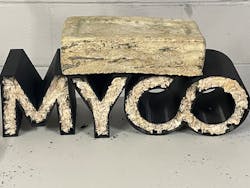Mushrooms: A New Solution for Construction and Demolition Waste?
A recent pilot project suggests a potential solution for hard-to-recycle construction and demolition waste: mushrooms.
A proprietary mix of fungi species successfully broke down used asphalt shingles in the pilot, which was a partnership between Lendlease, Rubicon Technologies, Mycocycle and Rockwood Sustainable Solutions. The shingles are ground up and mixed with the mushroom species, which then go to work breaking down the shingle components.
“The fungi are doing a couple of things,” explained Sara Neff, head of sustainability for Lendlease, which used all of the shingles from one single-family home to conduct the pilot. “They’re breaking down toxins so they’re no longer harmful, and they’re binding heavy metals. You can’t destroy a metal, but we’re making those metals not bioavailable so they don’t have the potential to cause harm. The end product can be used as compost.”
How the Partnership Came Together
The partnership was inspired by need. Lendlease was replacing the roofs of 214 homes in its Fort Campbell Army installation in Kentucky, and the material was destined for the landfill. At the same time, the company aims to achieve absolute zero in every scope by 2040, and part of reaching that goal requires reducing the company’s waste stream. Mycoremediation seemed like a natural fit for Lendlease. But were the mushrooms capable of breaking down asphalt?
Lendlease gathered the shingles from one home and brought Rubicon Technologies on board to transport them to Rockwood Sustainable Solutions’ facility in Lebanon, Tennessee. There, Mycocycle stepped in to conduct the pilot, mixing the sample with three strains of fungi, which ultimately broke down the shingle material successfully.
The company is developing treatment strains that can break down rubber and gypsum byproducts as well, but this is believed to be the first time the technology has been used to break down asphalt shingles.
“We looked at other solutions for the shingles, but this seemed to be the most cost-effective and the most physically effective,” Neff said, noting that less than 1% of shingles are recycled in the U.S.
Between 11 and 13 million tons of shingles end up in U.S. landfills each year, where they take upwards of 300 years to fully break down, according to the Environmental Protection Agency (EPA). By comparison, the entire mycoremediation process took just six weeks, with interim testing along the way to make sure the fungi species were doing their job.
What Does This Mean?
The implications for commercial real estate and facilities management are profound. Reducing the amount of material heading to the landfill can benefit building owners and managers financially, as well as helping them achieve green goals.
In addition, the biomaterial left from mycoremediation can not only be used as compost, it’s also a great substitute for packaging and insulation, Mycocycle noted. This biomaterial can reduce the amount of non-recyclable packaging and insulation products that are needed for projects.
“The best possible outcome would be that instead of our landfill waste being a cost to the business, the mushrooms break down the waste product into a product that has value,” Neff said. “It’s a revenue stream. Then, all of a sudden, you’re going to see a major change in how waste is handled.”
About the Author
Janelle Penny
Editor-in-Chief at BUILDINGS
Janelle Penny has been with BUILDINGS since 2010. She is a two-time FOLIO: Eddie award winner who aims to deliver practical, actionable content for building owners and facilities professionals.

